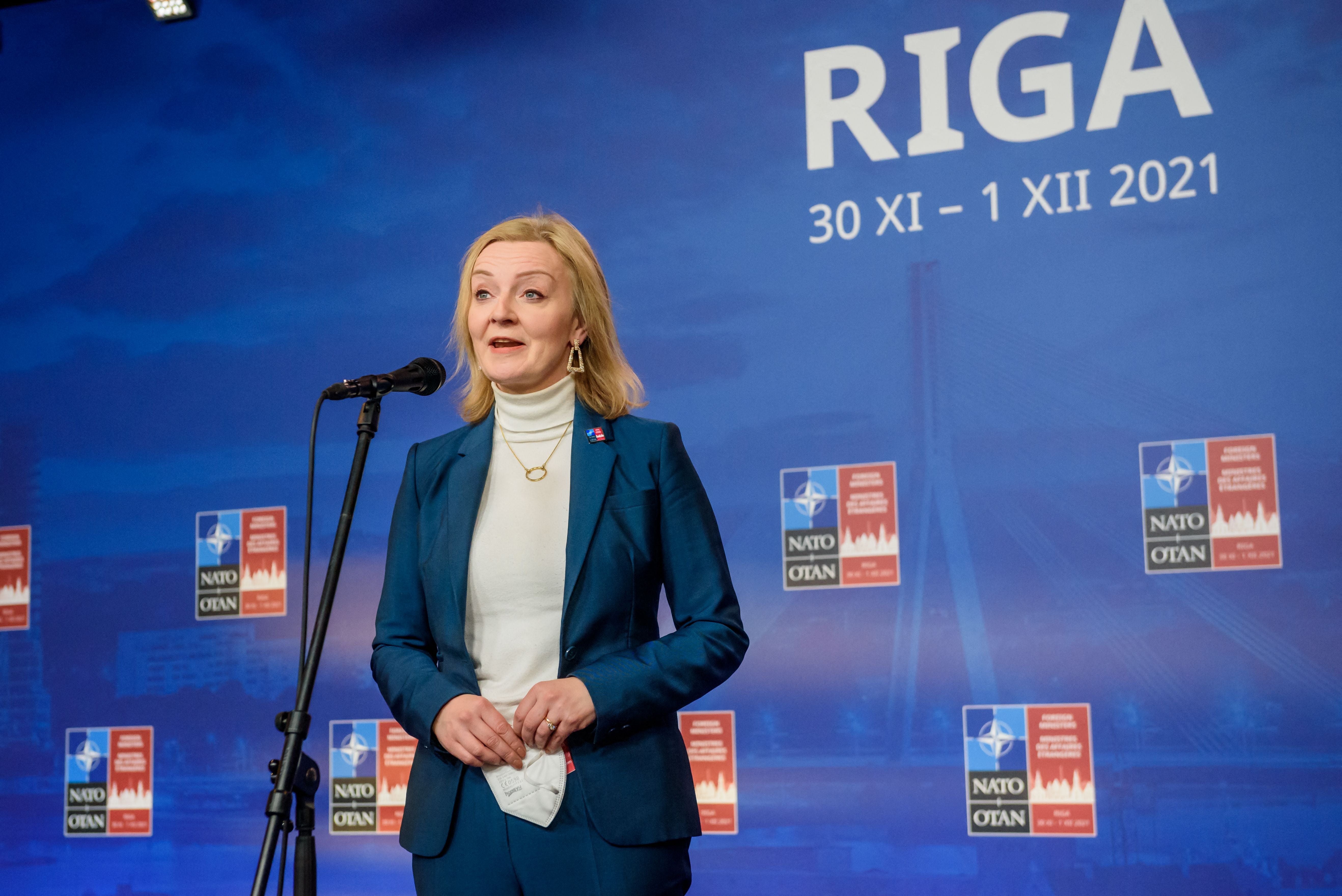The UK cannot strengthen Nato while waging a trade war with the EU
You cannot tell countries to play by the rules if your PM does not do that himself, writes Andrew Grice


Liz Truss wants G7 and Nato countries to wage economic war, through sanctions, against countries like Russia, and potentially China, which flout the international rules-based order. In an important speech this week outlining her vision, the foreign secretary said “we need a global Nato” to tackle global threats, including in the Indo-Pacific. She argued the G7 should “act as an economic Nato” by defending a partner targeted by an aggressor, in line with Nato’s “all for one and one for all” principle.
It’s an ambitious idea for the new geopolitical era that began when Russia invaded Ukraine. Yet the government’s approach is full of contradictions. Boris Johnson is about to risk an economic war with the EU by suspending key parts of the Northern Ireland protocol on goods going from Great Britain to the province. Legislation allowing the government to override it will be included in the Queen’s speech on 10 May.
This would be counterproductive on several fronts. The UK can hardly tell other countries to “play by the rules”, as Truss did in her speech, if Johnson rips up an international agreement he signed. That is precisely how the plan will be viewed around the world, and closer to home in the House of Lords, where the bill will meet strong opposition.
David Frost, who negotiated the protocol with the EU and later became Brexit minister, admitted this week that Johnson conceded an Irish Sea trade border to secure a Brexit agreement, but knew there would be trouble ahead. He told the Policy Exchange think tank: “We faced a choice – take this deal … and sort out the detail in 2020 … or walk away, fail to deliver Brexit on 31 October [2019]… We decided the lesser risk was to push the deal through and trust that we could sort out the detail with the EU later.”
In other words, Johnson knew the “oven ready deal” he offered at the 2019 election was nothing of the sort.
Overriding the protocol would divide the anti-Russia coalition at a critical stage of the war and delight Vladimir Putin as much as the 2016 Brexit vote did. It would sour relations between the UK and the Biden administration, which made it clear the UK’s stance is a “big issue”.
The Treasury is warning that a trade war with the EU would compound the cost of living crisis, just when Johnson is desperately seeking ways to alleviate it and has announced a fourth delay in bringing in checks on goods imported from the EU.
Unilaterally ditching the protocol would poison the UK’s relations with the EU, currently in their best shape since the 2016 referendum due to cooperation on Ukraine. It would kill stone dead Johnson’s hopes of resetting relations with Emmanuel Macron following his re-election. The French president’s distrust of Johnson would be vindicated. UK diplomats are gloomy about a rapprochement. One told me: “The UK is not going to be a priority for Macron. It will be events at home, Germany and Ukraine.” Better relations with France are the only way to stop migrants crossing the English Channel in small boats, not crowd-pleasing gimmicks like sending some asylum seekers to Rwanda.
Similarly, Johnson’s real audience when he legislates on Northern Ireland will be right-wing Tory MPs, who detest the protocol but are starting to turn against him over Partygate. His message to hardline Brexiteers: if you remove me, you might end up with someone who is not a true believer.
In public, the move will be portrayed as vital to protecting the Good Friday Agreement. Ministers believe the Democratic Unionist Party (DUP) will not return to the power-sharing executive after next Thursday’s elections to the Northern Ireland assembly unless the protocol undergoes major surgery. The DUP faces the highly symbolic prospect of Sinn Fein becoming the largest party and seizing the first minister’s job from it. To stop its nightmare becoming reality, the DUP is claiming that it has already persuaded UK ministers the protocol is unsustainable.
To keep up to speed with all the latest opinions and comment, sign up to our free weekly Voices Dispatches newsletter by clicking here
The other aim of legislating would be to put pressure on the EU to make concessions. Truss has adopted a more conciliatory stance since taking over the talks from Frost but there has been little significant progress. Although Johnson is driving the move to override the protocol, Truss will support it. (She, too, has her eyes on Tory backbenchers, in case Johnson loses his job.)
In doing the right thing in Ukraine, notably by sending arms, Johnson has shown that post-Brexit Britain can be a force for good in the world. He has rebuilt bridges with several EU countries, deservedly winning plaudits from them as well as Ukraine.
But if he provokes a needless economic war with the EU, he will throw away much of that goodwill and trust. And for the primary purpose of appeasing Tory Brexiteers, Johnson will be fiddling while Ukraine burns.






Join our commenting forum
Join thought-provoking conversations, follow other Independent readers and see their replies
Comments